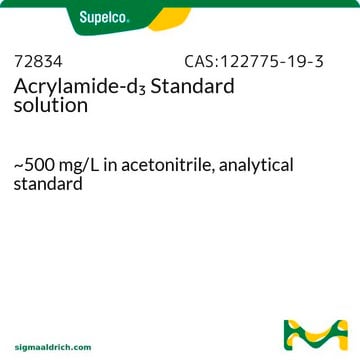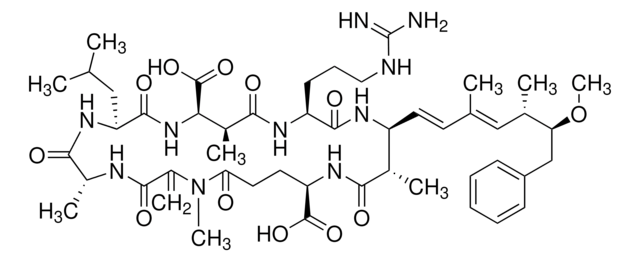08267
Acrylamide
certified reference material, TraceCERT®, Manufactured by: Sigma-Aldrich Production GmbH, Switzerland
Synonyme(s) :
2-Propenamide, Acrylic acid amide
About This Item
Produits recommandés
Qualité
certified reference material
TraceCERT®
Niveau de qualité
Densité de vapeur
2.45 (vs air)
Pression de vapeur
0.03 mmHg ( 40 °C)
Fabricant/nom de marque
Manufactured by: Sigma-Aldrich Production GmbH, Switzerland
Technique(s)
HPLC: suitable
gas chromatography (GC): suitable
Point d'ébullition
125 °C/25 mmHg (lit.)
Pf
82-86 °C (lit.)
Application(s)
cleaning products
cosmetics
environmental
food and beverages
personal care
Format
neat
Chaîne SMILES
NC(=O)C=C
InChI
1S/C3H5NO/c1-2-3(4)5/h2H,1H2,(H2,4,5)
Clé InChI
HRPVXLWXLXDGHG-UHFFFAOYSA-N
Vous recherchez des produits similaires ? Visite Guide de comparaison des produits
Description générale
Certified content by quantitative NMR incl. uncertainty and expiry date are given on the certificate.
Download your certificate at: http://www.sigma-aldrich.com.
Application
- Advanced Synthesis Techniques: Acrylamide is utilized in the synthesis of acyl cyclopentaquinolinones, showcasing its versatility in heterocyclic scaffold construction and acyl group introduction, proving essential for organic synthesis in pharmaceutical research (Xue et al., 2024).
- Material Development for Energy Sectors: Acrylamide-based polymers are applied in developing temperature-sensitive materials for oil and gas drilling, highlighting its importance in creating responsive materials for challenging environments (Yang et al., 2024).
- Innovations in Polymer Science: The use of acrylamide in the numerical simulation of polyacrylamide hydrogel via thermally initiated frontal polymerization provides insights into the controlled synthesis of hydrogels, useful in biomedical applications (Yi et al., 2024).
- Health Impact Studies: Research includes acrylamide in studies examining the inhibition of harmful Maillard reaction products by polyphenols, relevant for understanding chronic diseases linked to dietary acrylamide (Ye et al., 2024).
Conditionnement
Produits recommandés
Informations légales
Mention d'avertissement
Danger
Mentions de danger
Classification des risques
Acute Tox. 3 Oral - Acute Tox. 4 Dermal - Acute Tox. 4 Inhalation - Carc. 1B - Eye Irrit. 2 - Muta. 1B - Repr. 2 - Skin Irrit. 2 - Skin Sens. 1 - STOT RE 1 Oral
Organes cibles
Peripheral nervous system
Code de la classe de stockage
6.1C - Combustible acute toxic Cat.3 / toxic compounds or compounds which causing chronic effects
Classe de danger pour l'eau (WGK)
WGK 3
Point d'éclair (°F)
280.4 °F - closed cup
Point d'éclair (°C)
138 °C - closed cup
Faites votre choix parmi les versions les plus récentes :
Déjà en possession de ce produit ?
Retrouvez la documentation relative aux produits que vous avez récemment achetés dans la Bibliothèque de documents.
Les clients ont également consulté
Notre équipe de scientifiques dispose d'une expérience dans tous les secteurs de la recherche, notamment en sciences de la vie, science des matériaux, synthèse chimique, chromatographie, analyse et dans de nombreux autres domaines..
Contacter notre Service technique











